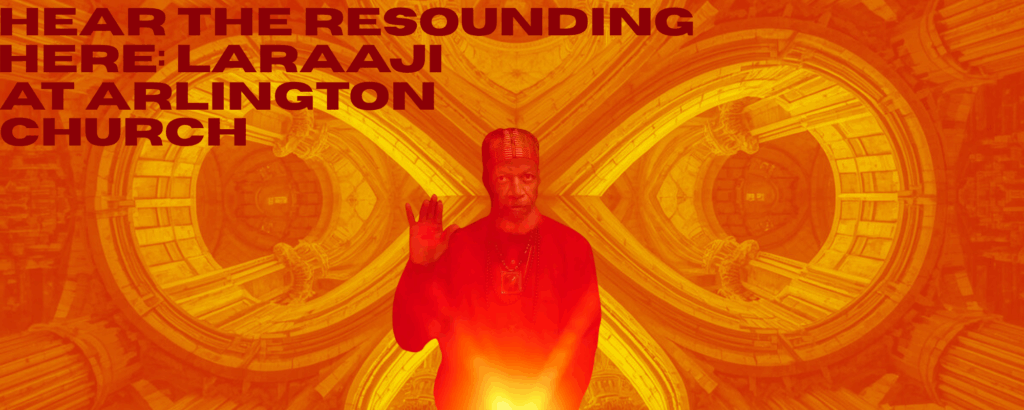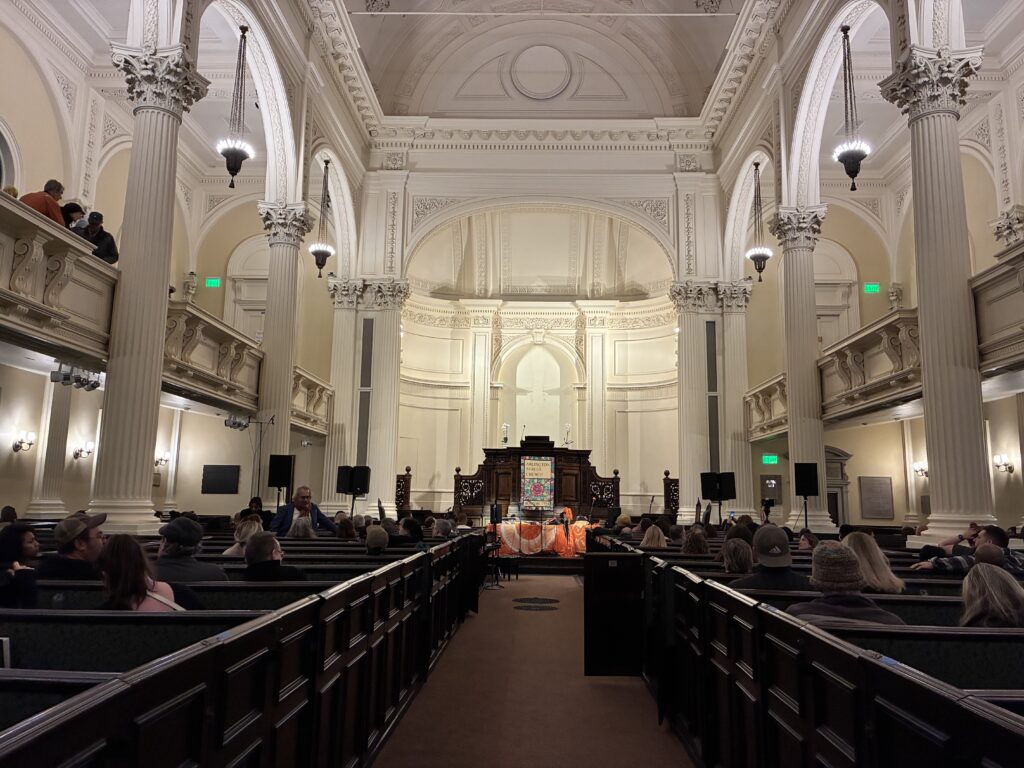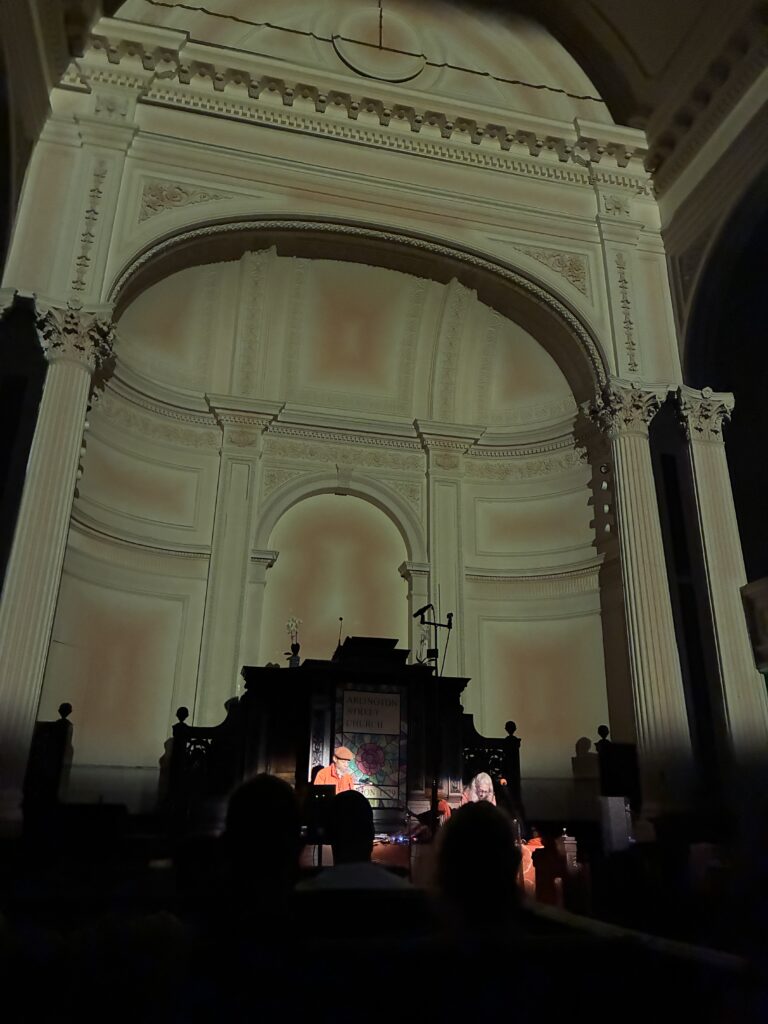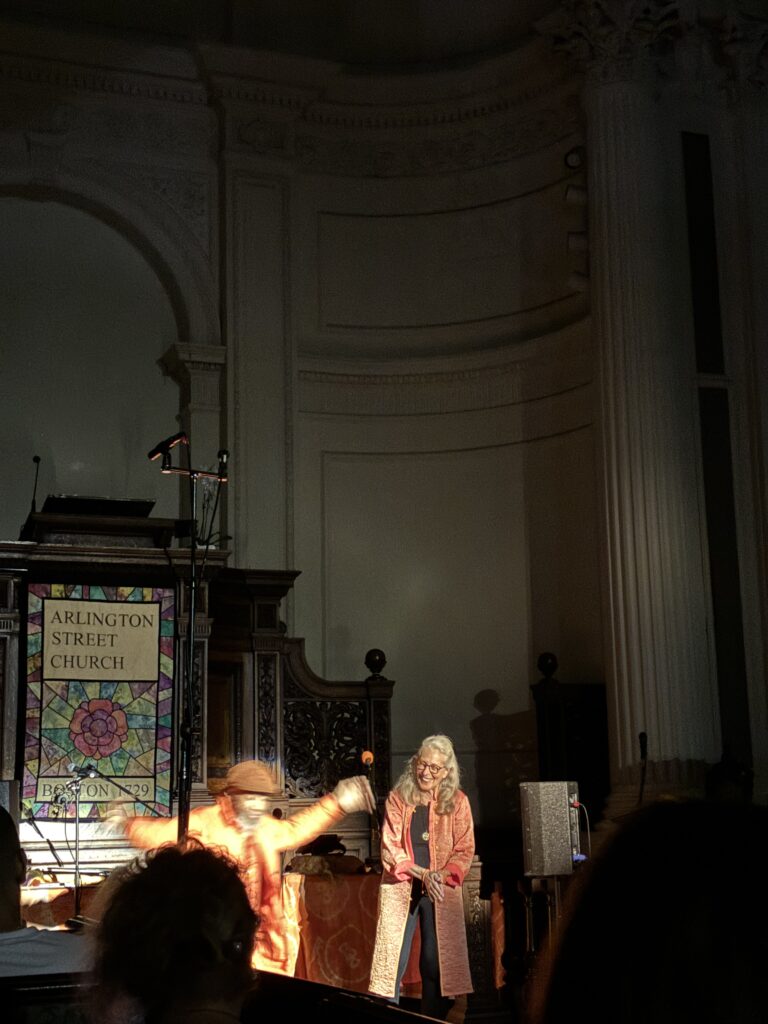Hear the Resounding Here: 45th Anniversary of Laraaji’s “Day of Radiance” at Arlington Church

Design by Christian Jones
By Christian JOnes
“Is someone sitting here?” I ask an older asian man, over the sound of crickets buzzing. He is sitting in a pew alone, three rows from the altar. “No no, go right ahead” he replies, and I slide in past him. Two men fill the empty seats next to me and there seems to be an unspoken rule of four to a pew. Some are couples, some are flying solo. People line the upper balcony too, excitedly leaning on the railing, waiting to catch a glimpse of Laraaji.

In an attempt to set the mood, I open the hymnal in front of me. The last one hundred pages or so aren’t dedicated to music notations but quotes—curated mantras, poems, and aphorisms. I am slightly surprised to see more recent poets, Mary Oliver and Audre Lorde, positioned next to Lao Tse and Christian Saints. Timeless truths in varied forms, I guess. I start reading a section called “The Wisdom of Other Religions.” Number 607, an Islamic poem, calls out to me:
Beloved Presence
Cloak yourself in a thousand ways;
still shall I know you, my Beloved.
Veil yourself with every
enchantment
and yet I shall feel you.
Presence
most dear, close and intimate.
I shall salute you in the springing
of cypresses
and in the sheen of lakes, the
laughter of fountains.
I shall surely see you in
tumbling clouds,
in brightly embroidered
meadows.
Oh, Beloved Presence, more
beautiful than
all the stars together,
I trace your face in ivy that
climbs,
in clusters of grapes,
in morning flaming the
mountains,
in the clear arch of sky.
You gladden the whole earth and
make every heart great.
You are the breathing of the
world.
From Shams Ud-Dun
Mohammad Hafiz
What is this presence? Beloved God or beloved lover? Both? Just then, the lights dim and the crickets stop chirping. Brian Sweeny, the founder of Ambient Church, introduces Laraaji and Arji OceAnanda Cakouros, who is Laraaji’s “Blissmate,” and a Sound Healer, Musician, Usui Reiki Master, and Dreamwork Teacher in her own right. The two walk on stage clad completely in orange. They move slowly, deliberately as if wading through currents of energy. The altar has been turned into a deck for the two of them, with spiritual instruments placed side by side with a laptop, board, and wires. They start small: Laraaji begins pulling a muted glissando on his electrified zither. From there the sounds begin to layer in glimmering cascades of resonance.
In Washington Square Park, 45 years ago, Laraaji, who still goes by Edward Larry Gordon, plays a different tune with the same radiant bliss. His arresting skill catches the ear of English musician, producer, and artist Brian Eno, who is in the process of creating his pioneering series of albums that he will call “ambient music.” Eno listens to Gordon’s autoharp, scrawls on a note then drops it into the musician’s case. The message: come by my studio, let’s make an album together. Gordon doesn’t see Eno’s note until a year later, when a couple who hears a thread in his sound approaches him and asks “Do you know Fripp and Eno?” A month after this, he finds the note in his zither case, among piles of dollar bills.
Six years prior to this moment, Gordon is down-flat on rent and ready to sell his guitar for some quick cash, when an inner voice tells him: “‘Don’t take the money, swap the guitar for the autoharp in the window.’” He listens to that voice, walks out with an autoharp and some cash, and in a few weeks, starts playing on the streets of Brooklyn in lotus position. Even months earlier, Gordon wins a role in Robert Downey Sr’s Putney Swope, a racial satire on advertising—but a bad review of his performance shakes his moral ground. He begins reading Sri Chinmoy, Satchidananda, Krishnamurti, Baba Ram Dass, and Osho. That’s when he hears it: “a brass choir in [his] musical imagination that turns [him] on to the experience of eternity and the simultaneity of everything in the universe.” This sound motivates him to experiment for hours, creating “a vocabulary [he] could use in…extended improvisations.” He modifies tunings, adds electric pick-ups, and hammers the strings until it sounds right.
Ambient 3: Day of Radiance is released in 1980 on Eno’s Obscure Records. The album is more overtly spiritual than Eno’s previous two ambient albums—no doubt due to Laraaji’s deeply intuitive style. Gordon is born in Philadelphia in 1943. As a child, attends church with his family, where the negro spirituals and gospel choirs transport him from the world of adults into his own imagination. At Howard University, Gordon studies piano and composition—Beethoven’s masses and requiems, and at night, he pursues his interest in jazz and R&B.

I hear these influences as Laraaji counts: “1-2-3-4-5-6-7-8-1, the only one, the creator.” Cakouros reads his rhythms with intuitions of her own, putting syncopated staccatos on her shaker to back up his soft-mallet hammering. At random intervals, one or the other laughs or begins chanting mantras, sprinkling in dashes of wind-chime glitter here and there. Psychedelic orange visuals dilate on the walls behind them. I close my eyes and see water dancing in the darkness of my eyelids while the prismatic sound engulfs me—speakers on either side alternate amplifying sound. The church reverberates like the Tibetan singing bowl that closes their set. Cakouros laughs into the microphone and a peaceful silence fills the cavernous space, as complete and full as the music that had arisen from it. A hesitant rivulet of applause, not wanting to break this 間 (Ma), is quickly joined by other streams, and Laraaji moves off the stage, swaying his arms like a car wash balloon and taking the energy all the way in. The two reassume contact with the Divine for their encore, and when it is really over, they have a standing ovation.

Laraaji and Cakouros stand in the corner of the church after their performance and a group of people line up to greet and thank them, myself included. The middle-aged man before me tells them, with his hands in Namaste, that his yoga teacher introduced him to the music. People are filing out of the old church into the wet night, but they don’t really leave. They are all still sitting in the soundbath, hearing the fullest meaning of that resounding word: “here.”
